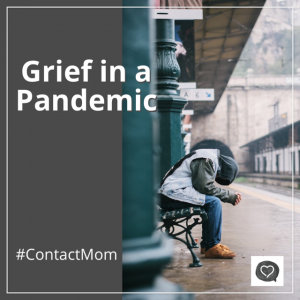GRIEF: a deep and poignant distress, a natural response to loss. The emotional suffering one feels when something or someone you love is taken away.
MOURNING: the act of sorrowing, a period of time during which signs of grief are shown.
We are a grieving world right now. EVERYONE has lost something that is causing varying levels of distress and suffering, and we are mourning.
- My daughter is grieving the loss of the expected finish to her college career and the long-anticipated graduation ceremony. She didn’t know as she left for spring break in early March that she was saying good-bye to her classmates, professors, and campus for the last time.
- One of my husband’s clients is grieving the nearing loss of her husband in hospice and the uncertainty of her financial future as her retirement savings have dwindled with the stock market.
- My 7-year-old is grieving the loss of his Lego® Club meetings with friends and being able to cozy up on the couch with Grandma as he practices reading. We’re thankful he can at least do that virtually.
- A friend of mine is grieving the cancellation of a much-anticipated trip to Europe with her granddaughter.
- Another friend is grieving the loss of his job and the means to support his family.
These five people are experiencing varying levels of loss. They’re all grieving and working through a mourning process. We have a tendency to rank other people’s levels of grief, don’t we? But when we do that, we minimize their grief. Instead of judging or comparing someone else’s loss with our own level of loss, we need to listen and love unconditionally.
A couple of weeks into our sheltering-at-home, we went around the dinner table and had all 7 of our children (ranging in age from 7-22) tell us what they were sad about losing due to the coronavirus pandemic. They rattled off fellowship with friends, end of the school year activities, concerts, a musical theater production they’d been rehearsing all year, summer job opportunities gone, travel, a weekend college visit, job interviews… the list went on and on. The weight of it felt heavy. The child who was sad about losing the ability to watch favorite sporting events on TV felt sheepish. Yes, in the grand scheme of things, that’s not that big of a deal. It’s small in comparison to the bigger losses we hear about. But it’s still a loss and a disappointment, and all of these losses, no matter how tiny, add up and take their toll on our emotions. And so we grieve, and that’s okay, and our kids need to know that’s okay. It’s not just okay, it’s necessary. The relief in each child’s face as he expressed his grief and sadness over each loss was tangible. To have their losses acknowledged, no matter how small, was freeing. They didn’t have to carry their loss alone because their family was around them, listening and showing compassion and empathy. Their siblings had a new understanding for what each was processing and carrying. They had empathy for each other and our world in a whole new way, and they realized they were not alone.
We didn’t end our dinner conversation puddled in our grief and tears. Instead, we turned to our rock, fortress and deliverer; our God, in whom we take refuge, our shield and the horn of our salvation, our stronghold. (Psalm 18:2) Praise be to the God and Father of our Lord Jesus Christ, the Father of compassion and the God of all comfort, who comforts us in all our troubles, so that we can comfort those in any trouble with the comfort we ourselves receive from God. (2 Cor. 1:3) We prayed and we talked about how our friends and neighbors were also grieving. That’s what is so unique about this pandemic. EVERYONE has lost something. EVERYONE is grieving. We talked about being understanding and compassionate and being careful not to minimize anyone’s loss and grief. We talked about ways we can help and serve others. We talked about the opportunity to point people to our Lord Jesus Christ who is the Father of compassion and the God of all our comfort. We ended our dinner with a beautiful time of prayer for each other and for our world because, thankfully, we “do not grieve like the rest of mankind, who have no hope.” (1 Thess. 4:13)





Leave a Reply